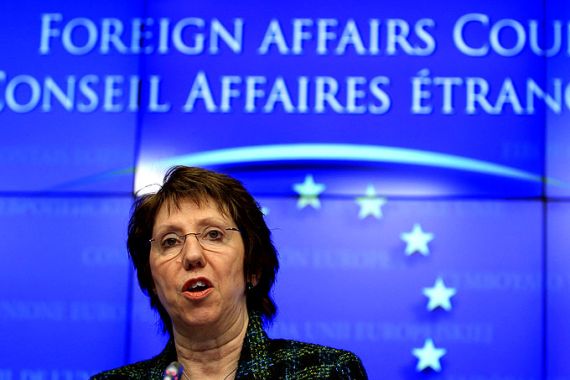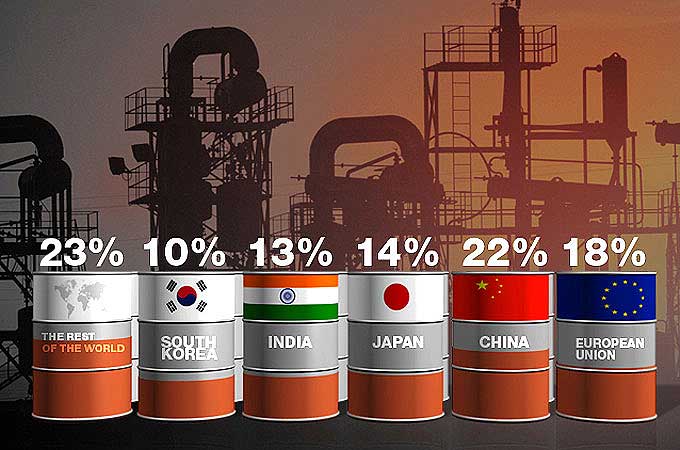EU approves tough oil embargo on Iran
Sanctions to ban new contracts between bloc’s 27 member states and Islamic Republic over its disputed nuclear programme.

Members of the European Union have adopted an embargo on Iranian oil as part of sanctions over the country’s disputed nuclear programme.
The EU sanctions, which were approved at a meeting in Brussels on Monday, follow financial punishments signed into law by the US on December 31 last year, and mainly target the oil sector, which accounts for some 90 per cent of Iranian exports to the EU.
The oil ban, along with sanctions against Iran’s central bank and other measures, came as Western powers stepped up pressure on Iran to return to negotiations amid concerns that it is moving closer to building nuclear weapons.
Iran denounced the EU measures, saying that the decision was “unfair” and “doomed to fail”.
“The method of threat, pressure and unfair sanctions against a nation that has a strong reason for its approach is doomed to fail,” Ramin Mehmanparast, Iran’s foreign ministry spokesman, told the state broadcaster.
For its part, the US said the EU sanctions were consistent with steps it had taken against Iran.
It also announced new sanctions against Iran’s third largest state-owned ban, Bank Tejarat, and the Trade Capital Bank, an affiliate. Both are still accessing the international financial system.
‘Another strong step’
Timothy Geithner and Hillary Clinton, respectively the US treasury secretary and the secretary of state, said in a joint statement that the moves from Europe were “another strong step in the international effort to dramatically increase the pressure on Iran”.
Under Monday’s embargo decision, all new contracts for crude oil and petroleum products between Iran and any of the EU’s 27 member states, will be forbidden. Existing contracts have to be suspended by June-end.
 |
| Eighteen per cent of Iran’s oil exports go to the EU |
There will be a review of the embargo on May 1, a month before all oil contracts cease.
The UN’s International Atomic Energy Agency (IAEA) also confirmed on Monday that a high-level visit to Iran would take place from January 29-31 for talks on Tehran’s nuclear activities.
Describing the EU measures as part of “an unprecedented set of sanctions”, William Hague, the British foreign minister, said: “Today’s sanctions show how serious EU member states are about preventing nuclear proliferation and pressing Iran to return to the negotiating table,” he said.
The meeting in Brussels came after French and British warships joined a US carrier aircraft group on Sunday and passed through the Strait of Hormuz, the narrow passage between Iran and Oman, which Iran has threatened to close in retaliation to tightening sanctions, thus imperilling much of the world’s oil supply.
The manoeuvre was meant “to underline the unwavering international commitment to maintaining rights of passage
under international law”, a spokesman for the UK defence ministry said.
Western countries believe Iran’s uranium enrichment programme is part of an effort to build a nuclear bomb, but Iran says the programme is to generate electricity.
A member of Catherine Ashton’s office, the EU’s high representative of foreign policy, confirmed to Al Jazeera that the decision to go ahead with sanctions was ratified by all 27 member states.
Joint statement
France, Britain and Germany said, just hours after the decision on Monday, that they were willing to negotiate with Iran if it was ready to talk seriously about its nuclear programme.
“We call on Iran’s leadership immediately to suspend its sensitive nuclear activities and abide fully by its international obligations,” the three countries said in a joint statement by their leaders.
|
Nick Spicer reports on the meeting from Brussels |
Calling on Iran to engage in “serious” and “meaningful” negotiations about its nuclear programme, they said in the statement: “Until Iran comes to the table, we will be united behind strong measures to undermine the regime’s ability to fund its nuclear programme.”
Issues of concern before Monday’s meeting included the impact and costs of the ban for countries like Greece, which relies on financial help from the EU and the International Monetary Fund to stay afloat, and received Iranian crude on preferential financing terms.
With a significant part of EU purchases of Iranian oil covered by long-term contracts, a grace period was an important factor in the efficiency of EU measures.
Al Jazeera’s Nick Spicer, reporting from the sidelines of the meeting in Brussels, said: “There will be a review of sanctions in three months, in May, to see how things are going and then the embargo will begin in full force on July 1.
“The reason for that is so that countries heavily dependent on Iranian oil, namely Greece, Italy and Spain, some of the most ailing members of the eurozone, can find new sources of supply, and secondly, to see what steps Iran is taking to come back to the negotiating table.”
Diplomatic push
In addition to the oil embargo, the EU measures are also expected to include sanctions against the Iranian central bank and a ban on trading in gold with the government, diplomats said.
A diplomatic push is under way, officials say, to secure supplies from other producers. Saudi Arabia, the world’s top producer, said this month it would increase production by about two million barrels per day.
|
Dorsa Jabbari reports on concern on Tehran’s streets |
The effort to take Iran’s 2.6 million barrels of oil per day off international markets has kept global prices high, pushed down Iran’s rial currency and is causing a surge in the cost of basic goods for Iranians.
Al Jazeera’s Dorsa Jabbari, reporting from Tehran, said the Iranian government believes that the EU sanctions will not really affect their oil revenues.
The Iranian government believes that the embargo will increase oil prices and, hence, will make up for the loss in revenue, our correspondent said.
Our correspondent said the impact of the sanctions would be felt by ordinary Iranians as it will increase the price of the US dollar vis-a-vis the Iranian rial, she said, noting that the dollar rose by about 10 cents following the EU sanctions announcement on Monday.
Speaking to Al Jazeera, Sadegh Zibakalam, a professor of political science at Tehran University, said that EU sanctions would not “terribly affect” Iran.
“The real problem for Iran comes [from] Asia and not from Europe,” Zibakalam said. “That is to say if China, South Korea, Japan … and India move towards … reducing their oil from Iran, that will create a serious problem for Iran.”
The four Asian nations purchase about 59 per cent of Iran’s oil each year, while EU countries account for 18 per cent.